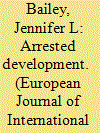| Srl | Item |
| 1 |
ID:
082704


|
|
|
|
|
| Publication |
2008.
|
| Summary/Abstract |
The International Whaling Commission's moratorium on commercial whaling took effect in 1986, seemingly marking the adoption of a new norm, that commercial whaling was no longer acceptable. But this norm has failed to become institutionalized. This article uses the norm life-cycle approach as developed by Finnemore and Sikkink (1998) to account for this failure. The effort ran aground because the norm proved unexpectedly ambiguous, a supporting epistemic community failed to emerge, the norm conflicted with other powerful norms, the prestige of the key anti-whaling states declined relative that of whaling states, and NGO tactics failed to win over the publics in key whaling states and instead created a counter-boomerang effect. The attempt may have resulted in the emergence of an alternative norm, but actors must act now to institutionalize it.
|
|
|
|
|
|
|
|
|
|
|
|
|
|
|
|
| 2 |
ID:
079932


|
|
|
|
|
| Publication |
2007.
|
| Summary/Abstract |
This article analyses the creation of the International Criminal Tribunal for the Former Yugoslavia (ICTY) in light of its potential for creating and institutionalizing justice norms in international society. The theoretical and analytical framework is based on the English School of International Relations and its central conflict between order and justice. The framework integrates a constructivist approach and the `norm life-cycle' to explain the dynamic process of norm emergence and institutionalization in international society. I argue that establishing the ICTY, despite a number of problems resulting from the way it was set up, constituted an important precedent for multilateral action towards institutionalizing respect for the rule of law and principles of individual justice. This suggests that these norms are being taken increasingly seriously and are being given priority over other fundamental principles of order, such as sovereignty and non-intervention. The ICTY's establishment constitutes a significant development in international politics and law and is evidence of the international society's move towards increased norm internationalization. The ICTY also contributed to the establishment of the International Criminal Court and the further institutionalization of human rights norms in creating a more just order
|
|
|
|
|
|
|
|
|
|
|
|
|
|
|
|